Information
Service of
the Serbian Orthodox Church
May
11, 2006

PATRIARCH PAVLE’S LETTER TO THE PRESIDENT OF THE STATE UNION OF SERBIA-MONTENEGRO, MR SVETOZAR MAROVIC

SERBIAN PATRIARCH
No. 183
May 8, 2006
In Belgrade
To His Excellency Mr. Svetozar Marovic,
President of the State Union of Serbia-Montenegro
Belgrade
Esteemed Mr. President,
In the course of the past month or slightly more, you have on several occasions expressed the desire to visit us in our patriarchal home. We regret that due to our responsibilities and health, which in the meanwhile has taken us to the Military Medical Academy, we were not able to receive you and to exchange thoughts with you about the present situation of our state and our people, about perspective and hope for the future, and the possible contribution of the Serbian Orthodox Church in overcoming or at least ameliorating some of the many accumulated difficulties through which we are all passing.
Hence, wishing to fulfill your wish in the manner that is for now, under home treatment, the only one possible, we address to your our fatherly patriarch’s letter with the intent of presenting in it our views on one of the most decisive issues of this historical moment of ours – the issue of the future of our state union itself. It is sufficiently fundamental by the very fact that Serbia and Montenegro are so mutually interwoven that there is hardly a family in Montenegro without immediate or distant kinfolk in Serbia, while in Serbia, in addition to analogous family relations, there is no one who can count the number of people who to a greater or lesser degree originate in Montenegro. But it is even more fundamental or decisive because largely dependent on it is the question of the future of Kosovo and Metohija as well as, of course, the question of the future internal situation in both Serbia and Montenegro.
This message of ours to you is not a political message in any sense of the word, from the elevated one among the ancient Greeks to the worldly and trivial in a world of party reciprocations and economic and ideological interests. Our message is exclusively guided toward the common good and future of all persons in Serbia and Montenegro, of course, in the light in which our humbleness as the Head of the Church, but also as a responsible citizen of our country, comprehends that good and that future according to [our] conscience.
So that it is understood precisely in this sense and – we hope – accepted by you, Mr. President, we remind you of a basic fact of Christian teaching about the Church herself: the Church according to its deepest being is one and from the unity of all local Churches, which together comprise the One Holy and Catholic Church, all her other attributes emanate. That is why she prays daily “for the unity of all” and calls on all [to follow] the path of unity through perfect mutual love, harmony and togetherness. She advocates, and frequently sacrifices herself, for unity – through reconciliation in mutual forgiveness and love – with those who persecute and hate her, let alone with those in whom she recognizes her spiritual children. She longs for the fulfillment of the prayer of her Founder, the Lord Jesus Christ, addressed to God the Father: “That they all may be one.” (Jhn 17:21)
This basic and undeviating position of hers throughout all twenty centuries of her existence and activity in the world, does not relate only to her members and their mutual relations but is projected onto her view of relations among peoples, communities, cultures, states, among people in general; moreover, between people and nature and all beings and creatures in the universe. And since the Church prays, advocates and strives for love, harmony and unity even in those places where these gifts of God do not yet exist, then this means that she, at least in equal measure, prays, advocates and strives for their preservation and enhancement where they already do exist. In this it is not important whether they exist as a relatively stable and healthy reality or a fragile and vulnerable one. After all, the communion of love in marriage and in the family is not stable if it is not constantly renewed and perfected, and this is even more true of every broader community – a people, a state, a united state and so on.
In light of this faith and this witnessing by the Church, we present to you, Mr. President, according to our conscience and our duty, our view of the future of our united state of which you are the head and whose unity you are responsible for guarding and protecting both by the definition of your position as head of state and your constitutional responsibilities and – much more so – by the standards of human and Christian morality. We wish to note, also, that our views are not only personal and non-binding views but that they have been clearly and unambiguously formulated on numerous occasions during the meetings of the Holy Assembly of Bishops of the Serbian Orthodox Church. We will present them in three summarized, basic theses:
1. We consider the unity of Serbia and Montenegro and the preservation of a united state to be a vital necessity and essential interest of all citizens individually and the people as a whole. The fragmentation of national and state unity built over the centuries and paid with immeasurable sacrifices cannot bring anything good. On the contrary, the fragmentation of the community may provoke far reaching harmful consequences and in the future endanger the people and its freedom, both in Serbia and in Montenegro.
2. As we have already emphasized, the preservation of the state unity of Serbia and Montenegro is of exceptional importance for the future of Kosovo and Metohija, and for the finding of a just solution for the Province within Serbia and the state union of Serbia and Montenegro, with the highest possible [degree of] autonomy in accordance with valid international standards and with respect for the full freedoms and all human and civil rights of the members of local peoples. We expect all politicians, especially those who hold the highest state functions, to work exclusively in the service of the people, for its benefit and for its future. We are convinced that such service includes work on the preservation of state unity.
3. Finally, we do not live just for ourselves but within a broader community – in the Balkans, in Europe and in the world. The importance of the stable and peaceful development of our entire region in this broader context is obvious. The preservation of a united state and the finding of a lasting and just solution for Kosovo and Metohija are also important for the process of re-establishing broke ties, a life of peace and dignity, reconciliation and communion in our peninsula and on our continent. For this reason our Church participates in spirited fashion and actively in every dialogue and every form of cooperation that contributes to this process. We see you, Mr. President, as our co-traveler on this road. On other roads – or, God forbid, waysides – we can only be co-sufferers. We have spoken and saved our soul.
Mr. President, please accept our expressions of especial esteem and our best prayerful wishes.
Archbishop of Pec, Metropolitan of Belgrade-Karlovci and Serbian Patriarch
Pavle /signed/

ANNOUNCEMENTS FOR CELEBRATION OF ST VASILIJE OSTROSKI THE WONDER-WORKER
On the occasion of the feast of St. Vasilije Ostroski His Eminence Metropolitan Amfilohije of Montenegro and the Littoral and His Grace Bishop Jovan of Dioclea with hierarchs and clergy will serve Holy Hierarchal Liturgy tomorrow in Ostrog Monastery. Holy divine service will begin at 9:00 a.m.
Tomorrow on the feast of St. Vasilije Ostroski the Wonder-worker, in the church dedicated to this Saint at Obzovica near Cetinje, the clergy of the Metropolitanate of Montenegro and the Littoral will serve Holy Liturgy on the occasion of the patronal feast of this church.
Traditionally, upon the completion of holy divine service a short memorial service will be served for all Orthodox Christians buried in the local cemetery.
On the occasion of the patronal feast of the church of St. Vasilije Ostroski at Obzovica, after the cutting of the slava cake a formal religious procession around the church will take place.
This year will mark the one hundred year anniversary of the construction of the church at Obzovica. On this occasion the parish of Cetinje in cooperation with the villagers of Obzovica has planned, with God’s help, the consecration of a new iconostasis currently being made during the course of this year.
On the occasion of the feast of St. Vasilije the Wonder-worker tomorrow His Grace Bishop Joanikije of Budimlje and Niksic with his clergy will serve Holy Hierarchal Liturgy in the St. Vasilije Ostroski Orthodox Cathedral in Niksic, starting at 9:00 a.m.
His Eminence Metropolitan Amfilohije of Montenegro and the Littoral, Their Graces Bishop Joanikije of Budimlje and Niksic and Bishop Jovan of Dioclea with the hierarchs of the Serbian Orthodox Church will head a formal religious procession for the glory and honor of St. Vasilije Ostroski the Wonder-worker through the streets of Niksic, leaving from in front of the Orthodox Cathedral at 6:00 p.m.
Source: Svetigora Press (S.K.)

FINDING A HEALTHY SOLUTION FOR KOSOVO AND METOHIJA
Interview in Politika daily, Belgrade, May 7, 2006
"The most important thing is finding a healthy and long-term solution for Kosovo and Metohija because that is the prerequisite for resolving all problems. If a wrong and unilateral solution is made, and such a tendency exists, then we will have a long-term tragedy in this region," warned Metropolitan Amfilohije of Montenegro and the Littoral in a conversation with reporters upon the conclusion of the Interfaith Conference on peaceful co-existence and dialogue.
The gathering of religious leaders in the Pec Patriarchate was not political but the fact that it was held at the same time as delicate negotiations in Vienna is inescapable. Some participants in the conference, such as Kosovo Mufti Naim Trnava, did not pass up the opportunity to remind Serbs that they must accept "the new reality in Kosovo and bind their fate to the land in which they live".
To what extent do gatherings such as this one create room for various political manipulations?
"There is always that possibility but it depends on the people [involved]. The Serbian Orthodox Church does not want to misuse the interfaith conference for political purposes. We are the hosts and this is not in the nature of our church. We have been invited here to testify about ourselves, our being. This testimony will be received by him who has ears to hear and eyes to see and a heart to understand," said Bishop Amfilohije, who headed the SOC delegation at the Pec Patriarchate on behalf of Serbian Patriarch Pavle.
Will this conference influence the final solution of the status of Kosovo and Metohija?
"A meeting of this kind and dialogue create a more healthy climate in human relations. I do not know to what extent it can contribute to the solution of the final question of the status of Kosovo and Metohija but in any case it can contribute to our mutual acquaintance with both what is good in us and with the fears we all have with respect to the others. We feel our wound [because] it is closest to us but frequently we are not in a situation to see the wound of others. We always have a tendency to transfer guilt to someone else, which is our legacy from Adam and Eve. Only when we realize our own guilt will we be in a situation to understand and acquaint ourselves with others."
If the decision is made to give Kosovo independence, what can the SOC do in that case?
"First, let us wait and see what the decision on the status of Kosovo and Metohija will be. Whatever it is the Church will continue to do what she has done for centuries – to protect her people and her own. After 2000 years of experience she knows what she has to do."
How will decisions and the Common Statement be implemented when the diocesan hierarch, Bishop Artemije, did not attend the conference?
"Serbian Patriarch Pavle, who is also the Archbishop of Pec, has sent his blessing and prayers for the success of this conference. The Holy Synod of Bishops is also represented here through its members. Everything that is said here carries weight. God willing, all the decisions we have made will be implemented."
Is the Church afraid of a new pogrom [against the Serbs and their church]?
"We hope that this will not occur because the purpose of this conference is to prevent such senselessness, which contribute nothing to anyone. Previous acts of senselessness have not brought good to anyone, either."
Why is it that a single church has not been built since March 17, 2004?
"It is not easy to rebuild. The Kosovo Mufti also mentioned that during the war in 1999 218 mosques were destroyed. But what is more tragic is that our churches were destroyed during a time of official peace and in the presence of international military forces. All in all, far more important than the rebuilding of religious sites is the creation of conditions so that refugees can return to their ancestral homes."
By M. Pesic
Source: www.kosovo.net

PATRONAL FEAST OF ST SAVA SEMINARY IN BELGRADE CELEBRATED
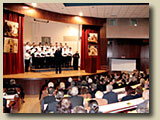 Yesterday on the feast of the Burning of the Holy Relics of St. Sava in Vracar [Belgrade], St. Sava Seminary celebrated its patronal feast. On that occasion a formal academy dedicated to St. Sava was held in the amphitheatre of the Orthodox Theological Faculty in Belgrade. Yesterday on the feast of the Burning of the Holy Relics of St. Sava in Vracar [Belgrade], St. Sava Seminary celebrated its patronal feast. On that occasion a formal academy dedicated to St. Sava was held in the amphitheatre of the Orthodox Theological Faculty in Belgrade.
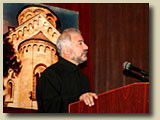 At the beginning of the academy Protopresbyter-Stavrophor Dragan Protic, rector of the Seminary, welcomed all in attendance, including His Grace Bishop Milutin of Australia and New Zealand; Protopresbyter-Stavrophor Savo B. Jovic, chief secretary of the Holy Synod of Bishops; representatives of the seminaries in Sremski Karlovci and Cetinje; officials of the cabinet of His Holiness Patriarch Pavle; hierarchal administrators of Belgrade, members of the Ecclesiastical Court, representatives of the Ministry of Religions and the Army of Serbia and Montenegro and many other friends of St. Sava Seminary. At the beginning of the academy Protopresbyter-Stavrophor Dragan Protic, rector of the Seminary, welcomed all in attendance, including His Grace Bishop Milutin of Australia and New Zealand; Protopresbyter-Stavrophor Savo B. Jovic, chief secretary of the Holy Synod of Bishops; representatives of the seminaries in Sremski Karlovci and Cetinje; officials of the cabinet of His Holiness Patriarch Pavle; hierarchal administrators of Belgrade, members of the Ecclesiastical Court, representatives of the Ministry of Religions and the Army of Serbia and Montenegro and many other friends of St. Sava Seminary.
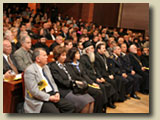 The homily was delivered by Mr. Goran Radenkovic, professor of the Seminary. The program continued with performances by the choirs of St. Sava Seminary directed by instructor Milan Milijanovic; the Stanislav Binciki Artistic Ensamble of the Army of Serbia and Montenegro directed by Mr. Milovan Pancic; and the Rastko Children’s Choir of St. Sava Memorial Cathedral directed by Jasmina Bouali-Stanojkovic. The rector thanked everyone and invited the guests to visit St. Sava Seminary to see the exhibition of icons and frescoes by students of icon and fresco painting of the Seminary under the guidance of Professor Goran Janicijevic. The homily was delivered by Mr. Goran Radenkovic, professor of the Seminary. The program continued with performances by the choirs of St. Sava Seminary directed by instructor Milan Milijanovic; the Stanislav Binciki Artistic Ensamble of the Army of Serbia and Montenegro directed by Mr. Milovan Pancic; and the Rastko Children’s Choir of St. Sava Memorial Cathedral directed by Jasmina Bouali-Stanojkovic. The rector thanked everyone and invited the guests to visit St. Sava Seminary to see the exhibition of icons and frescoes by students of icon and fresco painting of the Seminary under the guidance of Professor Goran Janicijevic.

ICONICALLY – THE PROBLEM OF FREEDOM AND THE CANONS
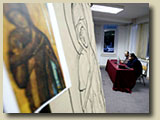 Dr. Petar Jevremovic, assistant professor in the Psychology Department of the Faculty of Philosophy of the University of Belgrade gave a lecture on Tuesday, May 9, 2006 at the Academy for Arts and Conservation of the Serbian Orthodox Church on the topic “Iconically – The Problem of Freedom and the Canons” as part of the public forum of Dr. Radoslav Grujic. Dr. Petar Jevremovic, assistant professor in the Psychology Department of the Faculty of Philosophy of the University of Belgrade gave a lecture on Tuesday, May 9, 2006 at the Academy for Arts and Conservation of the Serbian Orthodox Church on the topic “Iconically – The Problem of Freedom and the Canons” as part of the public forum of Dr. Radoslav Grujic.
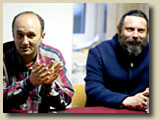 Through a review of the thoughts of philosophers and the Holy Fathers on art Professor Jevremovic concluded that it is very difficult to define a real icon painter. From the psychological viewpoint an icon always evokes two feelings: beauty and fear. The One who looks at us from the icon is more important than we who observe the icon. The eschatological moment in the icon exists and will always exist. The icon painter, in Professor Jevremovic’s view, must be free and not a mere sycophant because his attitude toward the icon must be free and without conceit. Through a review of the thoughts of philosophers and the Holy Fathers on art Professor Jevremovic concluded that it is very difficult to define a real icon painter. From the psychological viewpoint an icon always evokes two feelings: beauty and fear. The One who looks at us from the icon is more important than we who observe the icon. The eschatological moment in the icon exists and will always exist. The icon painter, in Professor Jevremovic’s view, must be free and not a mere sycophant because his attitude toward the icon must be free and without conceit.
Professor Jevremovic concluded by answering the many questions of students and professors who attended.
Photo by Vladimir Gogic
Source: www.akademijaspc.org.yu

FORMAL ACADEMY IN BANSKI DVOR
The commemoration of the 125-year anniversary of the Sarajevo Seminary continued last night with a formal academy in Banja Luka. This event, held in the large auditorium of Banski Dvor, was attended by His Grace Bishop Jefrem of Banja Luka, Republika Srpska president Dragan Cavic, Republika Srpska Assembly speaker Igor Radojicic and a large number of Assembly delegates, Republika Srpska Academy of Sciences and Arts president Rajko Kuzmanovic, deans and professors of the faculties of Banja Luka, the clergy of the Diocese of Banja Luka and other eminent cultural and public workers of the Republika Srpska capital.
Opening remarks were by His Eminence Metropolitan Nikolaj of Dabro-Bosnia, followed by a speech by Protopresbyter-Stavrophor Predrag Puzovic on the 125-year history of the Sarajevo Seminary. Performing songs and recitals for the audience in Banski Dvor were the Chamber Choir of the Section for Liturgical Music and Chanting of the Academy of Music of the University of East Sarajevo, the choirs of the Seminary and the Theological Faculty of Foca, the female singing group Rusalke, the Soko Serbian Society of Falconeers from Dobrun Monastery, and students of the Seminary and the Theological Faculty of Foca.
Thanks to Republika Srpska Radio Television, the entire program of the formal academy could be followed on television.
Source: Diocese of Dabro-Bosnia

PROMOTION OF THE BOOK “ORTHODOXY IN MONTENEGRO” HELD IN PODGORICA
The promotion of the book “Pravoslavlje u Crnoj Gori” (Orthodoxy in Montenegro) published by the Metropolitanate of Montenegro and the Littoral in cooperation with the company Jumedia Mont was held in Podgorica today. The book was published with the blessing of His Eminence Metropolitan Amfilohije of Montenegro and the Littoral.
The authors of this valuable monograph are Dr. Aleksandar Stamatovic, Mr. Budimir Aleksic, Presbyter Velibor Dzomic, Professor Predrag Vukic and publicist Jovan Markus. The monograph “Orthodoxy in Montenegro” appears a time when there is a flood of false and falsified history, especially the history of the Metropolitanate of Montenegro and the Littoral, said Father Velibor Dzomic.
“The basic purpose of this monograph is to give the reader an opportunity to learn the history of Orthodox Christianity on the territory of present day Montenegro in brief format as well as to become partly acquainted through photographs of Orthodox churches and monasteries in Montenegro with the spiritual and cultural treasure of the Orthodox Church which in Montenegro are represented solely by the Metropolitanate of Montenegro and the Littoral and the Dioceses of Budimlje-Niksic, Zahumlje-Herzegovina and Milesevo,” he said.
For more than 350 years Montenegro was ruled by the Metropolitans of Cetinje, Montenegro and the Littoral, the Mountains and the Exarchs of the Holy Throne of Pec, recalled journalist and publicist Jovan Markus.
“The least that I could personally do was to attempt to put together a correct catalog about these great persons from our history. Among the episcopes and metropolitans there have been Saints, ascetics, martyrs, translators, church organizers, geniuses, writers, historians, philosophers and great statesmen. Information and their biographies are scattered in various magazines, anthologies and reviews that are hard to obtain today. We tried to collect everything and publish it in a single book for the general audience. The basis for this work were lists and catalogs published since the time of St. Peter of Cetinje to the present day,” said Markus.
A separate section in the monograph is dedicated to Orthodox holy shrines, monasteries and churches, noted historian Predrag Vukic.
“Since the founding of the Early Christian Episcopate in Dioclea in the fourth century, monasteries were built on the territory of present day Montenegro, and churches that were to a large degree exposed to destruction, razing and torching during later historical periods. The greatest flowering of Orthodox church construction in the entire history of Orthodox church architecture occurred during the period of the Nemanjic dynasty and much later during the period of the Prince and King Nikola. Some monasteries built during the time of the Nemanjic, such as Djurdjevi Stupovi (the Pillars of St. George) near Berane, Moraca Monastery, Rezevici Monastery and others have remained preserved to the present day. The more recent among them, especially those in the areas of the Lim River, Lake Plav as far as the point where the Lim flows into the Drina, were destroyed from the sixteenth to the nineteenth century and have largely remained unrestored to the present day. During the Turkish occupation a significant number of the monasteries in Montenegro were exposed to razing, and some were destroyed several times. Cetinje Monastery was destroyed five times, Ostrog Monastery three times, Moraca Monastery was destroyed in 1504, Majstorovina Monastery near Bijelo Polje was destroyed in 1875, the Pillars of St. George near Berane was torched no less than six times just in the nineteenth and the beginning of the twentieth century, and so on,” Professor Vukic said.
The monograph “Orthodoxy in Montenegro” will be published on May 12, the feast of St. Vasilije Ostroski, as a supplement to the daily newspaper “Dan” at a price of one euro.
Source: Svetigora Press (R.L./ S.K.)

BISHOP FOTIJE MEETS WITH MAYOR OF SIBENIK
On May 10, 2006, His Grace Bishop Fotije of Dalmatia, accompanied by Protopresbyter-Stavrophor Ilija Karajovic, visited Ms. Neda Klaric, the mayor of Sibenik and on that occasion informed her of all the problems of the Serbian Orthodox Church in the city of Sibenik, placing emphasis on the return of confiscated and nationalized church property.
The Diocese of Dalmatia owns significant property in the city of Sibenik that has still not been returned to the Church. Moreover, in 1996 and 1997 some buildings owned by the Serbian Orthodox Church were usurped by others without the consent of the Church, which represents a serious obstacle to the normal life and work of the Diocese of Dalmatia and the church parish of Sibenik.
Specifically discussed during the meeting was the return of the building presently housing Radio Sibenik. The city of Sibenik has appealed a decision regarding the return of this building, located in Bozidara Petranovica Street, before the Administrative Court of the Republic of Croatia in Zagreb, which will further delay the return of this important building to its owner, the Serbian Orthodox Church, and consequently a legal and just resolution of this matter in accordance with the normative laws of the Republic of Croatia.
Source: Diocese of Dalmatia

BOSNIA-HERZEGOVINA PRESIDENCY MEMBER VISITS MONASTERY IN VOZUCICA
On Friday, May 5, 2006, the monastery of the Holy Trinity in Vozucica received a visit from Bosnia-Herzegovina presidency member Borislav Paravac and his associates, including Obren Petrovic, mayor of Doboj, and Izet Basic, mayor of Zavidovici. Prior to visiting the monastery, a meeting hosted by the mayor was held in Zavidovici to discuss the restoration of the monastery of Vozucica.
During the meeting promises were made that after years of delay concrete moves would finally be made to protect this medieval monastery from further ruin. President Paravac said that he would do everything within his power to engage public officials and institutions with respect to the restoration of the monastery, while Mayor Basic promised the support of the municipality of Zavidovici within existing budget constraints.
Mayor Petrovic announced that the municipality of Doboj had already earmarked about 100,000 convertible marks for the restoration of the monastery, and that these funds were immediately available. However, the beginning of restoration will have to wait because the Institute for the Protection of Monuments of the Bosnia-Herzegovina Federation, after years of promising to do so, still has not prepared a plan for the monastery’s restoration and without this plan work cannot begin.

“IN THE LIGHT OF CHRIST’S RESURRECTION – RESIDENTS OF BOKA CELEBRATE ST SAVA AND PREVLAKA MARTYRS”
Several hundred faithful from Boka Kotorska attended yesterday’s gathering in Tivat entitled “In the light of Christ’s resurrection – Residents of Boka celebrate St. Sava and the Prevlaka martyrs” dedicated to the religious holiday of the Burning of the Holy Relics of St. Sava in Vracar (Belgrade) and the imperishable memory of the sacrifice of the Prevlaka martyrs. The commemoration of this Orthodox assembly gathering the faithful around the myrrh of the holy relics of the Prevlaka martyrs began with Holy Hierarchal Liturgy served in the church of the Holy Trinity in Prevlaka by His Grace Bishop Joakim of Polog and Kumanovo with the concelebration of the clergy of Boka Kotorska.
The ship with the holy relics of the Prevlaka martyrs under the banner of the Miholjski Assembly, which for centuries has been the protector of the Holy Shrine of Prevlaka, arrived on the banks of Pina in the afternoon where, despite the rain, it was welcomed by a large number of faithful and choirs. This was followed by a religious procession through the streets of Tivat headed by the holy relics and Bishop Joakim with the priests of the hierarchal administration of Boka Kotorska.
The river of people then moved into the church of St. Sava where evening services were held and the veneration of the holy relics of the Prevlaka martyrs.
The seventh Festival of Orthodox Choirs of Boka, including participation by ten choirs, gathered more guests than ever before last night in the Club of the Army of Serbia-Montenegro in Tivat with the blessing of St. Sava and the Prevlaka martyrs. The blessing of St. Petar Cetinjski was conveyed to the faithful of Tivat by the rector of the Cetinje Seminary, Protopresbyter Gojko Perovic.
Speaking about the holy relics and the attitude of us as mortals towards them, Protopresbyter Gojko Perovic emphasized that it was laughable and pointless to burn the holy relics of St. Sava.
“The power of those holy relics and the Kingdom of Heaven which they contained was scattered after that terrible event in Vracar everywhere, and among the Serbian people through the centuries to the present day. Their power increased after this irrational and senseless attempt to physically destroy them. A reason for joy among us as Christians is that we believe that among us there are those who can see the Kingdom of Heaven and eternal life even before physical death. We Christians are partakers in that eternal life and what is there that can burn us, cause us to waver or stand in the way of our joy and optimism before such a life around which we should gather always. Death, and everything connected to it, illness, threats, fear, attacks, all of it amounts to a small and gentle dream,” said Father Gojko in his address to the faithful of Tivat. Presbyter Savo Denda thanked those present for coming on behalf of the Serbian Orthodox Church and the church parish of Tivat.
In addition to the aforementioned choirs, also performing were soloists Jovana Mustur and Ivan Zecevic, who performed compositions of Stevan Stojanovic Mokranjac, and Dusan Tadic. Also presenting themselves to the guests in Tivat were instrumentalists Ilijana Mastilovic, Dejana Knezevic, Professor Ana Mihaljevic, Andjelija Radinovic and Ivana Jovovic.
Source: Svetigora Press (Z.K./ S.K.)

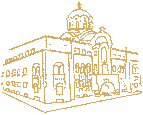
Copyright © 1999-2006 by
The Information Service of the Serbian Orthodox Church
11000 Belgrade
Kralja Petra I no.5
+381 11 3282 596
e-mail
|

